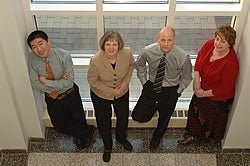Student midwives integrate technology with care through award given to ECU nurse faculty
GREENVILLE, N.C. — An East Carolina University School of Nursing faculty member was awarded $5,000 from the Bayada Corp. through Drexel University for integrating technology into the midwifery curriculum.
Patricia Payne, a certified nurse midwife and clinical assistant professor at ECU, received the Bayada Award for Technological Innovation in Nursing Education and Practice. Payne’s project was chosen from more than 55 abstracts received from nurse clinicians and educators nationally and internationally, said Debby McCormack, contest coordinator and recruitment manager for Drexel University College of Nursing and Health Professions.

ECU School of Nursing project participants are, from left to right, Yanhao Zhu, lead programmer, Patricia Payne, project coordinator and clinical assistant professor, Karl Faser, IT services manager, and Janice Taleff, clinical instructor. Photo by Forres
While only one person could submit an application, Payne credited the teamwork of fellow ECU staff and faculty Karl Faser, Janice Taleff and Yanhao Zhu in winning the award. Faser and Zhu are computing consultants and Taleff is a certified nurse midwife and clinical assistant professor. Payne received the award on June 10 at the Drexel University Nursing Education Institute in Providence, R.I.
ECU’s team wrote a software program that allows student midwives to track their clinical experiences in the field. Information collected includes outcome measures for care such as vaginal or Cesarean birth and risk factors.
The American College of Nurse-Midwives has encouraged the collection of data, but traditionally midwives have written data by hand or collected it using personal spreadsheets that can be cumbersome. As a result, most nurse midwives are not collecting sufficient data about clinical outcomes for the patients they serve, Payne said.
The purpose of the software was to create an efficient mechanism for students to learn how to collect data and, most importantly, how to use the data to improve clinical outcomes, Payne said. The software is used with pocket computers making it possible for students to collect data at their clinical sites and then enter it into their desktop computers. The software has the potential for use with other learners and practitioners to help foster an environment where data collection is seen as a valuable resource, Payne said.
Payne is working with the ECU Office of Technology Transfer to explore commercialization and other opportunities for making the unique program available to benefit the greatest public good, said Marti Van Scott, director of the Office of Technology Transfer.